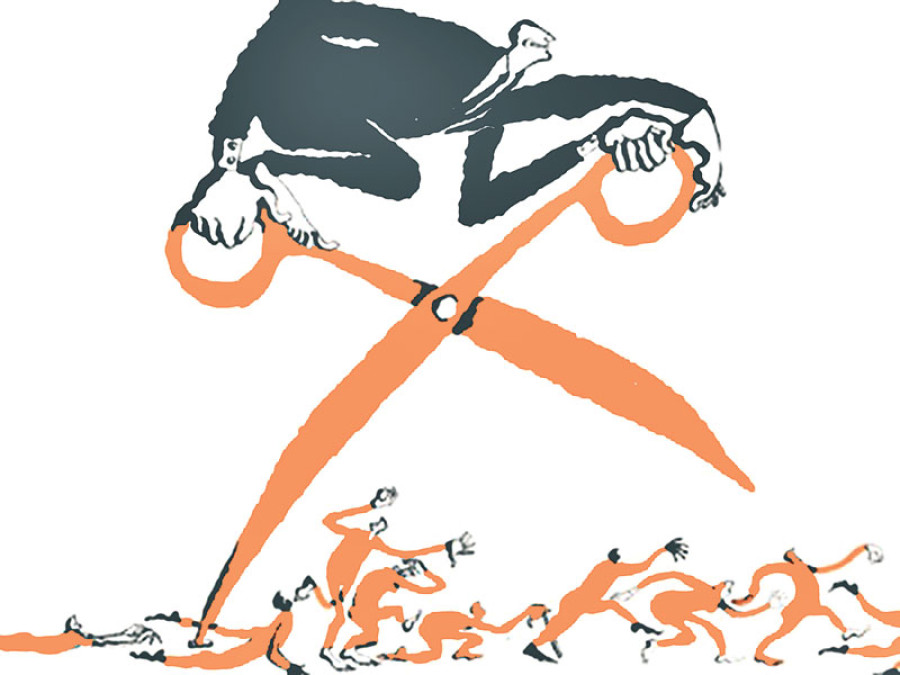Opinion
Mirage of land reform
The Maoists lost their revolutionary zeal after getting a taste of bourgeois comforts
Kalpana Jha
In an agrarian economy like Nepal marked by great scarcity and unequal distribution of land and a large rural population living below the poverty line, there is a compelling need for land reform for both economic and political prosperity. Land inequality is high with excessive control by feudal lords. Moreover, landholding in Nepal not only defines a person’s economic but also social status and political power. Land reform was one of the core items on the agenda of the Maoists, and some of their key slogans were: “Land should belong to the tenants. Land under the control of the feudal system should be confiscated and distributed to the landless and the homeless.”
Land has long been monopolised by a handful of self-styled ‘high caste’ elites in the hills and the Tarai, which meant that they also had significant control over the larger political economy. Therefore, the Maoist insurgency emerged as a revolution for not just the simple reason of land redistribution, but liberation from debt bondage and freedom from patronage that started with control over land but later pervaded the entire state mechanism.
In Nepal, the proportion of the labour force employed in agriculture is large; therefore, the Maoist movement appealed to this mass and it became successful. However, the exalted objectives remained confined to rhetoric and never materialised in reality. Land reform at best only remained a façade that did nothing to challenge the existing power relations. The aggressive advocacy at one time by the Maoists to confiscate land from the elite and distribute it to the poor has proved a failure with the landed elite gaining back control over their possessions.
Many benefits
If land reform had been successful, it would have not only benefitted the poor peasants but also upheld the agrarian economy, which is on the verge of collapse today. The fall of the monarchy would then have made true sense with the real collapse of feudalism. It would have made a tremendous improvement in the economy as redistribution of land could have provided a permanent asset base for a large section of the rural landless population and made former peasants landowners, marking the collapse of the age-old exploitative feudal regime. Similarly, consolidation of holdings, tenancy regulation and updating of land records would widen the access of small and marginal landholders to improved inputs, thereby directly leading to increased agricultural production. This could have prevented the mass exodus of rural youth, which has directly impacted the country’s internal productivity.
Unfortunately, the dreams that have been sold are far removed from reality. The problem lies in the fact that the new institutions of democracy have been captured by the same landed elite who dominated the pre-transition political economy. The
government has only been a mechanism to protect the power of the same landed
class who now sustain the bonds of clientelistic dependency by monopolising governance mechanisms. Capital has replaced land as the factor against which power is measured. However, the people who monopolise this power are mostly former landlords as yesterday’s land has been the source of today’s capital in the context of Nepal. Votes are still traded for clientelistic delivery, which could be settling a court case for the peasant, helping him to acquire a passport for his son to migrate to the Gulf in search of a better future, or acquiring a birth certificate for a Tarai Dalit which is the legitimate right of all children born in the country.
No real change
For the marginalised, democracy is thus still non-existent. The lofty goals to confront land rights and grapple with the problems facing the landless population has faded in the selfish pursuit of power, and what has taken over is a well entrenched nexus of former landlords in the bureaucracy and governance which refuses to share power with the people. It is evident that the Maoists, who were at one point staunch advocates of land reform, have now been co-opted by the mainstream. In their pursuit of power, they have compromised the very foundation on the basis of which they managed to win the People’s War as well as the first Constituent Assembly elections. This is largely the result of weak determination coupled with an unscrupulous desire to remain in power, which has led to ideological decay.
While alleviating landlessness and its consequences is in the government’s own interest, it will also be a way to address past injustices and create a stronger mechanism to protect the landless population. Further, it will serve as a strong foundation for economic prosperity and consequently sustainable democracy which is at risk of degenerating. However, there is a clear lack of political will to address this issue. The unethical political alliances we are seeing are a clear example of lack of political will to address the people’s genuine concerns. They are designed to fulfil the politicians’ selfish desire of monopolising power.
At the end of the day, what we need to understand is that nothing has changed; the only thing that has changed is the form of oppression. Real change could have been achieved and Nepal would have set an example in all of South Asia, but what remains is ruins of the dream that succumbed to the greed for power inherent in the political leaders.
Jha holds a Master’s degree in Social Work from the Tata Institute of Social Sciences




 19.12°C Kathmandu
19.12°C Kathmandu










